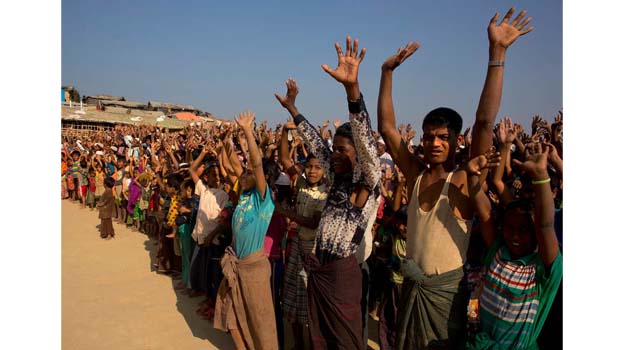Burmese farce over Rohingya identity

It is quite disturbing that instead of taking back Rohingyas, Myanmar now trying to misguide the international community to avoid its obligations for the repatriation and reintegration of the forcibly displaced Rohingya. Of late, Bangladesh noticed yet another round of such farcical attempt by Myanmar’s Union Minister for International Cooperation U Kyaw Tin. He resorted to misrepresentation of the whole issue as well as laying unjustified blames on Bangladesh in his effort to refute the well-founded remarks by Bangladesh Foreign Minister on Rohingya crisis at the Preparatory Ministerial Meeting of the 18th Summit of the Non-Aligned Movement. Also in his statement, Tin accused Bangladesh of mischaracterising Rohingya crisis as "religious persecution", "driving an ethnic group out of the country", "ethnic cleansing" or "genocide", among others.
We condemn such absurd response from Myanmar. It is clear that Nay Pyi Taw is doing so to avoid its obligations for the sustained repatriation and reintegration of the forcibly displaced Rohingyas. Myanmar has always portrayed Rohingyas as “illegal migrants” from Bangladesh during the colonial era, and recently tried to label them as refugees from across the border who fled the 1971 Liberation War that led to Bangladesh’s independence.
The Rohingya people have faced decades of systematic discrimination, statelessness and targeted violence in Rakhine State, Myanmar. Such persecution has forced Rohingya women, girls, boys and men into Bangladesh for many years, with significant spikes following violent attacks in 1978, 1991-1992, and again in 2016. Yet it was August 2017 that triggered by far the largest and fastest refugee influx into Bangladesh. Since then, an estimated 745,000 Rohingya—including more than 400,000 children—have fled into Cox’s Bazar. In Myanmar, entire villages were burned to the ground, families were separated and killed, and women and girls were gang raped. Most of the people who escaped were severely traumatized after witnessing unspeakable atrocities. These people found temporary shelter in refugee camps around Cox’s Bazar, Bangladesh, which is now home to the world’s largest refugee camp.
According to historians, Rohingyas are a distinct ethnic community in Myanmar’s Rakhine state, having evolved over the centuries through mingling of migrated people of various races and cultures from different parts of the world with the local people in Rakhine. As such, on two previous occasions Myanmar recognised displaced Rohingya in Bangladesh as their lawful residents and repatriated them. After the recent influx, Myanmar signed bilateral instruments with Bangladesh identifying them as "Myanmar residents". As far as the nationality of Rohingya is concerned, there cannot be any scope for confusion.
It needs no emphasizing that attempts to create controversy over their identity at this stage clearly indicate that Myanmar still pursues the policy of exclusion and marginalization of its ethnic minorities. Myanmar often complains against Bangladesh for non-cooperation in repatriation. Such accusation is baseless and could be guided by an ulterior motive. No one agreed to return on two previous repatriation attempts, as the Rohingyas are not convinced of the level of security and sustainable livelihood in Rakhine.
The international community, which has failed so far to put adequate pressure on the military junta in Myanmar to take their citizens back, should realise the dangerous effect of prolonged internment in camps. Every day that passes increases the vulnerability of the refugees. Bangladesh expects a more vigorous role of the international community in the diplomatic front to make Myanmar take back the Rohingyas.
With the UN now throwing in its weight, the international pressure on Myanmar will be too much to ignore, and it is crucial to keep the momentum going to see a resolution to this crisis, which Bangladesh has been handling with great finesse even though our own resources are at breaking point. It has long been clear that the only way to get proper action from Myanmar’s generals and their civilian enablers is to compel it, through prosecutions of the offenders by the International Criminal Court, through sanctions, travel bans or a freeze on assets.
It needs no emphasizing that Bangladesh wants to resolve the Rohingya issue through peaceful negotiation, and the country expects similar reciprocity from Myanmar and international community. But the silence from the so-called international community is deafening. Dhaka has always been serious about a safe repatriation of the refugees. It has done its best to help the Rohingyas return to their homes. The onus now is on Myanmar authorities to address the Rohingya issue sincerely and convincingly. The situation demands concrete intervention from international community to intensify pressure on Myanmar to create a congenial environment for Rohingya repatriation. Bangladesh expects a more vigorous role of the international community in the diplomatic front to make Myanmar take back the Rohingyas. If the world community fails to resolve Rohingya crisis, a number of threats will emerge to jeopardize stability, peace and security of the entire region. Now the question is, whether or not Myanmar will move from a policy of trickling and tricking of Rohingyas rehabilitation to a more sincere approach.
Sayeed Hossain Shuvro is Editorial Assistant, Bangladesh Post.




